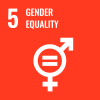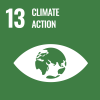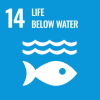Metapán, El Salvador – Rosa Sandoval grew up surrounded by water and fishing nets. Born by Lake Güija, in Metapán – about 130 kilometers from El Salvador's capital to fisherfolk parents, she learned the trade of fishing from a young age and how important it was for generating income for her family and community.
Throughout her years living by the shores of the lake, Rosa and her family have been through and survived multiple storms, floods, and even hurricanes. These disasters are becoming more frequent in the Lake Güija area, a situation that has put the local community at risk and threatens their livelihoods.
"For us, the main challenge here is the effects of climate change on all the activities we do in fishing. There’s a season when the winds are quite strong, with very high waves, that flip the boat."

Rosa shows one of the cages where she raises tilapia fish with the support of her brother Photo: IOM 2024/Noe Alvarado
Seasonal livelihood
During the rainy season, the water level rises, and the fish swim deeper in the waters, taking refuge in volcanic caves and rocks, Rosa explains. During those months, fishing is no longer an option. There are no nets to pull in or fish to sell, so the income barely covers basic needs. Rosa recalls hearing her neighbors refer to those days as "the season of the little frames," because, as her grandparents explained, during that time, people would resort to prayers."
Facing the impacts of climate change, Rosa and her family had to adapt their way of living and turn to agriculture, in order to be able to remain on their land. On their volcanic land, they grow corn and beans, but over time, the cost of agricultural supplies has risen, rendering production mainly for family consumption. Even so, agriculture remains an alternative, although not always entirely meeting the needs.
To get through the "season of the little frames," Rosa and her family found an alternative source of income: aquaculture, a way of "farming" fish under controlled and managed conditions, allowing Rosa to decide when to plant and when to harvest. In the months when the lake doesn’t provide enough, tilapia becomes their main source of income, balancing between the lake and the ponds depending on the season.
But climate change has complicated things. Storms are becoming more intense, droughts longer, and both agriculture and tilapia farming have suffered significant losses. Rosa and her cooperative have implemented measures to mitigate the damage, such as using pumps to keep the ponds watered.

Rosa rows from her boat on Lake Güija, Metapán. Photo: IOM 2024/Noe Alvarado
For both environmental and economic reasons, migration is becoming increasingly common in the communities around Lake Güija, especially among young people whose opportunities for personal and professional development are shrinking.

Rosa learned to drive boats from a young age. In addition to being a means of transportation, it is her primary tool for fishing work. Photo: IOM 2024/Noe Alvarado
Rosa participated in the Regional Forum “Empowerment of Women, Adolescents, and Girls in Rural Settings” as part of the launch of the Inter-American Decade for the Rights of Rural Women, that took place in Honduras on 23 July 2024.
Closing the breach
For Rosa, fishing is more than just a job. It’s part of her identity and her journey for recognition in a male-dominated field. As a community leader, she has actively participated in local cooperative projects to empower women and increase their resilience in the face of climate change.
“If every woman is empowered with the right opportunities, many of the difficulties they face could be reduced. A lack of options, both in knowledge and resources, holds them back,” she says.
Rosa recently joined 53 other rural Salvadoran women in a disaster risk management training, organized by the International Organization for Migration (IOM) to help build resilient communities prepared for future challenges.
To ensure a sustainable future for communities like Rosa’s, we must advocate for people to be at the heart of climate policies. We need more solutions for people to adapt to climate change and to be able to remain on their land. Migration must remain a choice.



